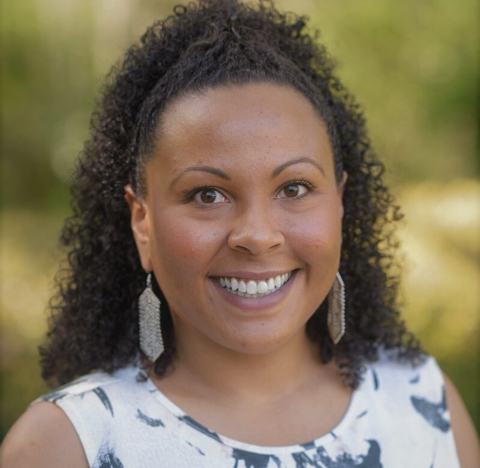Dr. Latoya Allen
Dr. Allen earned the Toffler Scholar Leadership Award in 2018 at the University of Florida.
Biography

Dr. Latoya Allen was raised in Madison, Wisconsin. After graduating high school, she attended college at the University of Wisconsin-Whitewater, a satellite school of the University of Wisconsin. The small, liberal arts school offered support and mentorship that she couldn’t have gotten from larger schools, making it a great fit for her learning style.
As Dr. Allen pursued her undergraduate studies, one of her professors noticed her aptitude for and interest in research. This professor, Dr. Kristen Curran, invited Dr. Allen to work in the research lab. Dr. Allen’s first project was focused on circadian biology, specifically assessing when circadian genes become synchronous in different organs, and how circadian gene expression impacts somite differentiation. The work exposed Dr. Allen to experience with PCR, immunofluorescent staining, confocal imaging, and other research tasks that ultimately opened doors for her future career path.
In addition to teaching her about research processes and methods, Dr. Curran also exposed Dr. Allen to the many options available to her after graduation, including Ph.D. programs. Growing up, Dr. Allen didn’t know many people who had a Ph.D. In fact, not many of her family and friends attended college. Learning about the possibilities of continuing her education felt like opening up an entirely new world, one that was both exciting and a little scary. She recalls questions from her friends and family, like “Are you sure?” “What are you going to do with that?” and even “Who does that?” Nonetheless, she faced the unknowns to build an impressive academic and research record.
With prompting from Dr. Curran, Dr. Allen was accepted into the McNair Scholars Program. This program helps prepare undergraduate students for doctoral studies. McNair participants have demonstrated strong academic potential and are either first-generation college students with financial need or members of a group that is traditionally underrepresented in graduate education.
As part of her experience as a McNair scholar, Dr. Allen participated in a summer research program at the University of Wisconsin. At the end of the summer research program, all the participants presented their research internally. The University of Wisconsin faculty members were so impressed with Dr. Allen’s research that they asked her to stay on and work while she finished her undergraduate degree at Whitewater.
After graduating, she attended the University of Florida and worked in the McKnight Brain Institute, earning her Ph.D. in Biomedical Sciences. It was during these studies that she was awarded the Toffler Scholar Leadership Award.
Today, Dr. Allen works in toxicology safety assessment in early drug development. Her vital work helps to ensure the safety of new medications, allowing them to move forward to human clinical trials. She also gives back to the community by mentoring younger students, presenting at the University of Wisconsin, and meeting with newer cohorts of McNair scholars.
“I don't come from a family with a college-educated background. Learning about Ph.D. programs from my undergraduate mentor was really my first introduction to a world that I didn’t really know about, my friends didn’t really know about, and my family didn’t really know about.”
- Dr. Allen
Karen Toffler Charitable Trust Investment
The Toffler Leadership Awards at the University of Florida McKnight Brain Institute recognize excellence in neuroscience research and education. Recipients must be students enrolled in a Ph.D., M.D. or combined doctoral program at the University of Florida.
The Toffler Leadership Award validated Dr. Allen’s skills and offered opportunities for leadership experience. She was able to speak to both of these credits during her job interviews after graduation. The award also gave her the confidence to pursue speaking and mentorship opportunities. She is active in the community, mentoring students, giving presentations, and meeting with current McNair Scholars.
What drives me is to have some part in improving other people's lives. This idea sometimes gets a little lost in basic science research, but all that research is necessary in order for other scientific advancements, like drug development, to occur. Learning about the mechanism of something is helping to uncover different potential targets for drugs. In the future, as the process of science uncovers more, this foundational research could lead to a drug to improve someone's dementia, or Alzheimer's, or diabetes, or any other disease.
- Dr. Allen